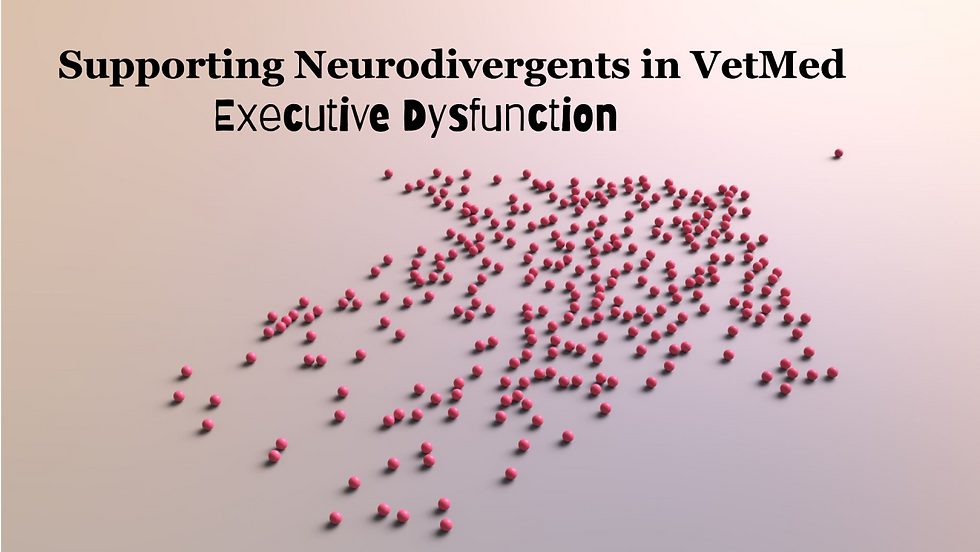Executive dysfunction is a common challenge that can affect the ability to plan, organize, initiate, and complete tasks. This condition is often associated with neurodivergence, including ADHD, autism spectrum disorder, and other cognitive differences...however anyone can experience this! Executive dysfunction can manifest in various ways, such as difficulty in managing time, struggling with multitasking, or finding it hard to start or finish tasks. In the fast-paced and emotionally demanding veterinary profession, recognizing and supporting team members with executive dysfunction is crucial for fostering an inclusive and productive workplace environment.
Executive dysfunction can significantly impact an individual's work performance and personal well-being. It's not a lack of effort or motivation but a neurocognitive difference that requires understanding and support. Executive Dysfunction DOES NOT EQUAL LAZY. Neurodivergent individuals may have unique strengths, including heightened empathy for animals, specialized interests, and innovative problem-solving skills, which are invaluable in veterinary practice.
Leaders in the veterinary profession can implement several strategies to support team members experiencing executive dysfunction:
Create Structured Environments Provide clear and consistent routines that help reduce the cognitive load associated with planning and organization. Visual aids, checklists, and organizational tools can be beneficial. Ie. Cycles of service expectations, Visual aids for radiograph techniques, and decision tree analysis for specific hospital functions.
Set Clear, Achievable Goals Break down tasks into smaller, manageable steps with clear deadlines and expectations. This approach can help individuals with executive dysfunction by providing a more accessible framework for task completion. There is a difference between telling someone to fill Clavamox drops and explaining that Clavamox drops is a liquid antibiotic in the pharmacy cabinet that requires opening the package and filling it with 14mls of water, the syringe is found next to it and directions are on the back of the package if you need the reminder. \
Offer Flexibility in Task Management Recognize that neurodivergent individuals may have different peak productivity times and working styles. Offering flexibility in how and when tasks are completed can accommodate these differences, leading to better outcomes. Jane might be a great room tech until 3pm and then needs to be moved into a treatment tech to finish the shift because of energy management. That is how you can maximize Jane's output and the pet's care.
Foster Open Communication Encourage an environment where team members feel comfortable discussing their challenges and needs without fear of judgment. Regular check-ins can help identify support needs early on.
Provide Positive, Constructive Feedback Focus on providing feedback that acknowledges efforts and achievements while offering constructive guidance on areas for improvement. Positive reinforcement can boost confidence and motivation.
Invest in Training and Development Provide training for all staff on diversity, equity, inclusion,and belonging. Neurodiversity is just another piece of that pie. Train on executive dysfunction to foster understanding and empathy within the team. Additionally, consider professional development opportunities that play to the strengths of neurodivergent individuals.
Utilize Technology and Tools There are numerous technological tools and software designed to aid with time management, organization, and task prioritization. Encouraging the use of these tools can help mitigate the effects of executive dysfunction. The newer AI scribes are huge for helping our veterinarians keep track of all the things, and for the technicians trying to capture the entire history without having duplicity of questioning.
Create a Supportive Culture Cultivate a workplace culture that values diversity, equity, inclusivity, and belonging. Recognizing the unique contributions of neurodivergent individuals and creating pathways for their success can enhance team cohesion and overall practice performance.
Supporting neurodivergent team members with executive dysfunction is not about accommodations but about leveraging the unique strengths and perspectives they bring to the veterinary profession. Remember accessibility without accommodations HELPS EVERYONE. By implementing thoughtful strategies and fostering an environment of understanding and support, leaders can enhance the well-being and productivity of their entire team, ultimately leading to improved care for their animal patients and a more inclusive, innovative workplace.
(Originally published on Linkedin)


Comments